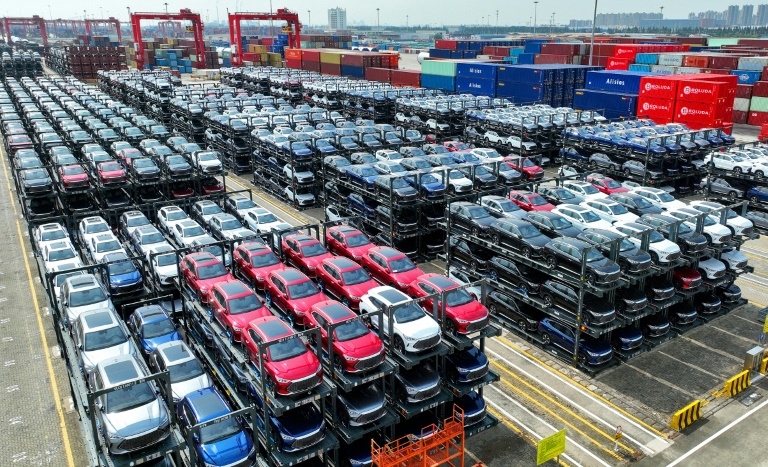Struggling foreign carmakers in China are turning to local tech giants to stay competitive in the world's largest electric vehicle market, where shiny smart screens, driver assistance and sophisticated mapping technology are in high demand. I'm looking for it.
At the recent Beijing Auto Show, China's largest auto exhibition, a number of foreign companies announced technology partnerships, from Nissan Motor Co., Ltd.'s partnership with Baidu to Toyota's cooperation agreement with Tencent.
The two Japanese companies were once among China's dominant traditional auto giants, but are now struggling to keep pace with a new generation of local EV startups.
“They are a notoriously conservative company and their competency is not technology,” Tu Le, managing director of Sino Auto Insights, told AFP.
“They've been looking to invest in frontier technologies in the automotive space, but that hasn't come naturally,” he said.
“But because of trends in the Chinese market and new entrants into the space, companies like Xiaomi and Huawei with backgrounds in high-tech consumer products, they are not taking a more open attitude towards technology. I am forced to do so.”
These companies are currently in fierce price competition with more than 100 Chinese electric vehicle brands, all fighting to offer wealthy consumers the most attractive prices and cutting-edge technology.
As a result, foreign companies are suffering, Gregor Sebastian, senior analyst and EV industry expert at independent research firm Rhodium Group, told AFP.
“Foreign automakers in China in general and Japanese automakers in particular have been really hurt in the Chinese market over the past 12 to 18 months,” he said.
“They are rapidly losing market share…This has to do with the intense competition in China from manufacturers like BYD as well as a number of EV startups.”
BYD, which has emerged as the country's undisputed champion in this field in recent years, surpassed Tesla in global EV sales in the final quarter of 2023.
– “Walled Garden” –
Foreign automakers are now under pressure to find ways to improve their position in a market increasingly dominated by low-cost, high-tech vehicle lineups.
Smart technology features are one of the new requirements for gaining an edge in China's EV race.
However, as geopolitical competition between the U.S. and China has intensified in recent years, the Chinese government has increased its control over foreign companies' access to information it deems sensitive, including the sophisticated and large amounts of data generated by domestically produced cars. is being strengthened.
One of the main reasons foreign automakers seek partnerships with local tech companies is to profit from their innovations, and Chinese automakers blame the industry's intense competition. .
But the other thing is access to data.
“There's a bit of a walled garden scenario going on here,” Daniel Koller, head of automotive and mobility at consultancy Intralink, told AFP.
“China wants to be seen as following the rules and allowing foreign companies market access,” he said.
“But they really don't want to give up on the security aspect.”
The solution is to work with Chinese partners.
“If we want to provide advanced mapping solutions in China, we need to work with local companies to license their mapping data or form joint ventures,” Sebastian told AFP.
~Looking to the future~
Nissan praised the deal with Baidu for providing “exciting intelligence systems and AI-based services to customers in China and beyond.”
Toyota also said its AI deal with gaming giant Tencent will help it capitalize on Chinese consumers' growing desire for advanced smart features in the cars it sells in China.
Baidu also recently started working with South Korean car giant Hyundai and its affiliate Kia Motors.
Tu Le of Sino Auto Insights said these Chinese companies are exactly the “experts” in areas where foreign companies are lagging behind.
“Coupled with the fact that most automakers are particularly weak in digital, this creates a great opportunity for Tencent and Baidu to pivot into the mobility space.”
During a surprise visit to Beijing last week, Tesla boss Elon Musk met with senior Chinese officials and secured important safety clearance for locally produced electric vehicles.
The regulatory breakthrough coincides with reports that Tesla has signed a deal with Chinese tech giant Baidu for maps and navigation.
Sebastian told AFP that the technology partnership was driven by a longer-term strategy aimed at gaining an advantage in the Chinese market.
“This is more about the next five to 10 years than the next two to three years,” he said.
“If political relations with China remain stable and do not deteriorate further, perhaps[foreign companies]can leverage Baidu and Tencent for next-generation products in the 2030s.”
And Tu Le said the potential for AI in smart cars could be huge.
“Imagine if a vehicle's autonomous system could access all of its historical data, in addition to its ride and driving data, and its purchasing habits and preferences,” he said.
“Every few minutes there could be a way to try to monetize it.”
bur-pfc-qan/ojo/je/dan


